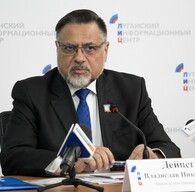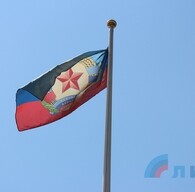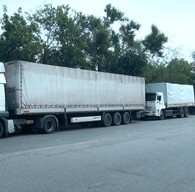The publication of Ukrainian opposition politician Viktor Medvedchuk’s talks with Lugansk People’s Republic representatives is a consequence of Ukraine's political infighting, Lugansk People’s Republic representative in the Contact Group humanitarian subgroup, head of the LPR working group on POW exchange Olga Kobtseva said at a press briefing at the Lugansk Media Centre.
Earlier, Ukrainian mass media outlets published a recording of a telephone conversation between Medvedchuk and Kobtseva which took place in 2015. The parties discussed the POW exchange.
“Yes, I talked with Mr Medvedchuk as the official representative of Ukraine at the negotiations (Kiev special representative on humanitarian issue); Mr Medvedchuk was responsible for prisoner release,” she said. “Why have they posted the recording of my conversation with Medvedchuk?
"I regard it as a political blackmail attempt, new political intrigue and new political infighting in Ukraine.”
Kobtseva said that the telephone conversation took place in 2015; back then, other officials were also engaged in talks with Donbass Republics representatives, including Irina Geraschenko who was Kiev’s representative in the Contact Group humanitarian subgroup at the time.
“When Gerashchenko tells journalists that she never conducted dialogue with us, it is not true; Ukrainian media can find the video recordings concerning POW exchanges where Mrs Geraschenko was present, while Mrs Kobtseva attended these prisoner exchanges as the Lugansk representative,” she said.
Kobtseva noted that she continued, within her authority, to hold talks with Ukraine’s official representatives and Ukrainian special services representatives.
“It’s a normal practice to discuss technicalities in implementing this or that accord; it has been happening to date,” she said.
The LPR representative advised Ukrainian President Vladimir Zelensky to “think about his reputation” before permitting the publication of telephone conversations that had been “taken out of the context.”
The Ukrainian government launched the so-called anti-terrorist operation against Donbass in April 2014. Conflict settlement relies on the Package of Measures for the Implementation of the Minsk Agreements, signed on February 12, 2015 in the Belarussian capital by the Contact Group members and coordinated by the Normandy Four heads of states (Russia, Germany, France and Ukraine). The UN Security Council approved the document by Resolution No 2202 of February 17, 2015 and called upon the parties to ensure its implementation.
The document provides for comprehensive ceasefire, withdrawal of all heavy weapons from the contact line, starting a dialogue on reconstruction of social and economic ties between Kiev and Donbass. It also envisages carrying out constitutional reform in Ukraine providing for decentralization and adopting permanent legislation on a special status of certain areas of the Donetsk and Lugansk regions.
To facilitate the work of the Contact Group, four working groups were set up under its aegis to deal with issues of security, politics, return of internally displaced people and refuges, as well as with social, humanitarian, economic and rehabilitation issues. *i*t


